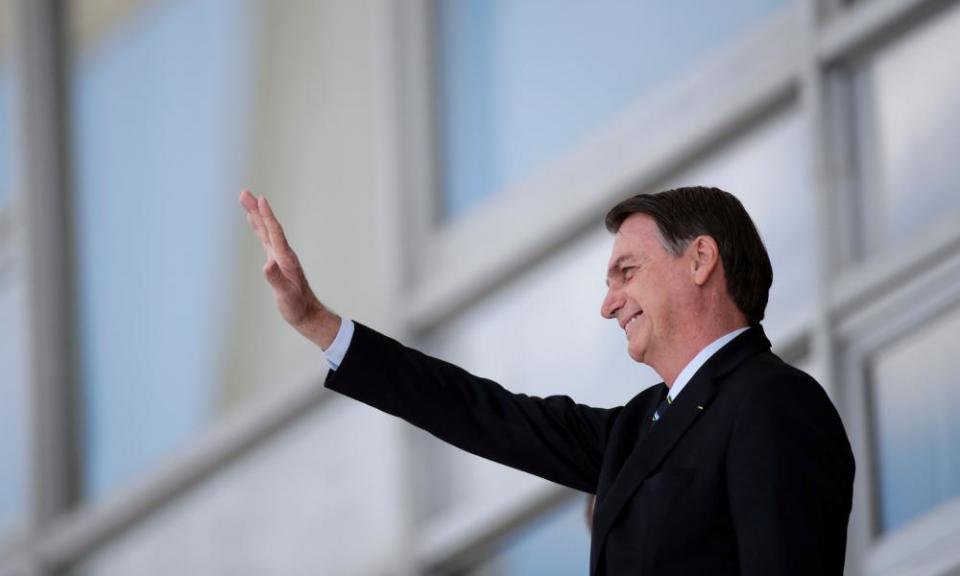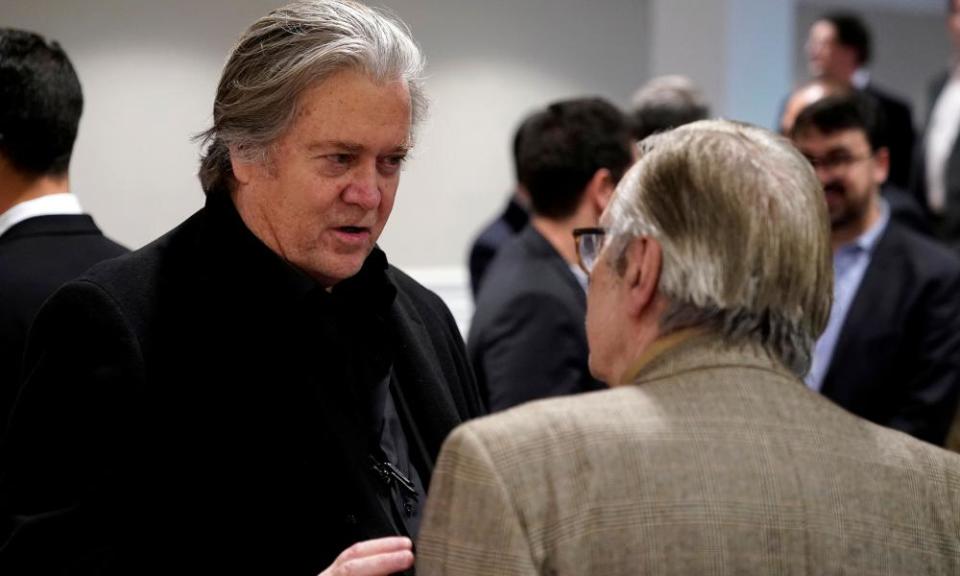'Same rhetoric': Bolsonaro's US visit to showcase populist alliance with Trump

Brazil’s president, Jair Bolsonaro, landed in Washington DC on Sunday two days before meeting Donald Trump, his first visit to a foreign leader since taking office on 1 January – a visit he hopes will showcase the alignment between the right-wing, populist leaders of the two biggest economies in the Americas.
Bolsonaro’s spokesman said the visit showed “the priority the government gives to building a solid partnership with the United States of America”, while Trump’s national security adviser, John Bolton, called the trip a “historic opportunity” (although the effect was somewhat undermined by a tweet in which he called the Brazilian president “Bolonsaro”).
Related: Bolsonaro in spotlight after photo with Marielle Franco murder suspect surfaces
As well as trade talks, the presidents will sign a technology deal to open up an underused Brazilian satellite base. Brazil will likely be given “major non-NATO ally” status, which could help it buy cheaper military equipment.
“President Bolsonaro brings a real energy to the relationship, he’s determined to make progress,” Bolton told TV Globo. “We’re really very excited about being able to partner on a number of issues internationally.” The crisis in Venezuela is a priority, he said.
The visit marks the first to the US by a Brazilian president since Dilma Rousseff in 2015 – two years after she cancelled a rare state visit following revelations the National Security Agency had been spying on her.
But diplomats caution that traditionally-neutral Brazil may shoot itself in the foot by getting too close to Trump as he wages a trade war against China – Brazil’s biggest commercial partner.
“This won’t further any national interest,” said Rubens Ricupero, a former Brazilian ambassador to Washington and Rome. “Today’s international American agenda has nothing to do with Brazil.”

Brazil’s president Jair Bolsonaro promised to follow Trump’s lead and move Brazil’s Israel embassy from Tel Aviv to Jerusalem.Photograph: Ueslei Marcelino/Reuters
Adding to such concerns was the presence of Trump’s former strategist Steve Bannon, seated beside Bolsonaro at a conservative, “opinion formers” dinner on Sunday night. Bannon recently named Bolsonaro’s congressman son Eduardo, also in Washington, the South American representative for his international far-right network, the Movement.
But it remains unclear what benefit for Brazil such close ties might bring: the former Trump adviser was sacked from the White House in 2017, and the US president “genuinely dislikes Bannon”, according to a friend of Trump, talking privately.
Wendy Schiller, chair of political science at Brown University, said Secretary of State Mike Pompeo and Bolton “far outweigh any influence Bannon may try to wield.”
Bolsonaro shares several of Trump’s habits: he is active on Twitter, which he uses alongside Facebook to reach his millions of followers. He also dismisses negative media coverage as “fake news”.
He has promised to follow Trump’s lead and move Brazil’s Israel embassy from Tel Aviv to Jerusalem and travels to Israel this month.
“Bolsonaro has purposely been emulating Trump,” said Monica de Bolle, director of the Latin American programme at John Hopkins University. “The rhetoric is the same.”
Much of that rhetoric owes much to another star guest seated beside Bolsonaro at the “opinion formers” dinner: Olavo de Carvalho, a pipe-smoking right-wing Brazilian philosopher who broadcasts via internet to hundreds of thousands of followers from the amply-stocked library of his house in Virginia.
Related: Brazil's new foreign minister believes climate change is a Marxist plot
“He’s the ideological lynchpin in all of this,” said de Bolle.
In January, De Carvalho dined at the home of Bannon, who has described him as a “hero”, and on Saturday night, the former White House adviser hosted a screening of a crowded-funded film about De Carvalho.
De Carvalho, who once worked as an astrologist, became more widely known in Brazil after some of his newspaper columns were compiled in a book which raged against globalists, Marxists, feminists. The book referenced rightwing conspiracy theorists like Jerome Corsi, and declared that anal and oral sex can cause cancer. It became a best-seller in Brazil.
Although de Carvalho was a communist in his youth, his main target is the left, which he regards as immoral. He blames the ascension of the centre-left Workers’ Party, which ran Brazil from 2003-2016, on a global communist conspiracy and damns a long list of progressive thinkers from Voltaire to Noam Chomsky as “deprived of any superior moral feeling”.
“Communism was not destroyed, it only changed its strategic framework,” he said in one video interview. In another video he accused Pepsi Cola of using aborted fetuses as sweetener.
De Carvalho’s writings provided an intellectual basis for Brazilian conservatives angry at the corruption crisis and recession that beleaguered the last years of Roussef’s rule. “He broke the leftist intellectual hegemony,” said journalist Felipe Moura Brasil, who compiled his bestselling collection.

Steve Bannon speaks with Olavo de Carvalho, a right-wing Brazilian philosopher, before the showing of a documentary on the government of Brazilian president Jair Bolsonaro in Washington DC on Saturday.Photograph: Joshua Roberts/Reuters
Such ideas have been echoed by Bolsonaro’s foreign minister Ernesto Araújo who told diplomacy students last week a global Marxist conspiracy had seized control of “the production of ideas”, adding: “We will sell soy and iron ore. But we will not sell our soul.”
Araújo, who had never served as an overseas ambassador before Bolsonaro’s surprise appointment, has previously downplayed climate change as part of a plot by “cultural Marxists,” and wrote in a 2017 article that Donald Trump could save the West.
“I was surprised and a little bit scared by some of the ideas in that article,” said one diplomatic source familiar with the US negotiations, who argued Araújo’s ideological excesses will be constrained by foreign policy realities: “Interests will prevail over ideology in the long run.”
In his weekly Facebook Live on Thursday, Bolsonaro sounded unsure as to where to place Brazil’s relationship with the US.
“The United States for us – it could be, with all certainty - a great partner. Our great economic partner is China. In second place, the United States,” he said.
Last year he accused the Chinese of “buying Brazil” and angered the Chinese government by visiting Taiwan. Now he plans to visit China.
Analysts said the mixed messages are due to an a power struggle between an ideological group represented represented by Bolsonaro, his son Eduardo and Araújo and a more pragmatic faction including finance minister Paulo Guedes – one of seven ministers on this trip –and former military officers in Bolsonaro’s administration such as vice-president Hamilton Mourão, who has repeatedly contradicted the president.
Last week Mourão told the Financial Times Brazil could create a “back channel” with Venezuelan military officials for a negotiated exit for Nicolás Maduro, a much less aggressive posture than that voiced by the Bolsonaros and US hawks like Bolton.
This clash is “the most significant political dynamic in Brazil today”, said Oliver Stuenkel, a professor of international relations at São Paulo’s Getulio Vargas Foundation, reaching for a Portuguese metaphor to describe it.
“A tarântula bêbada” – the drunk tarantula.
Additional reporting by David Smith in Washington.

 Yahoo News
Yahoo News 
